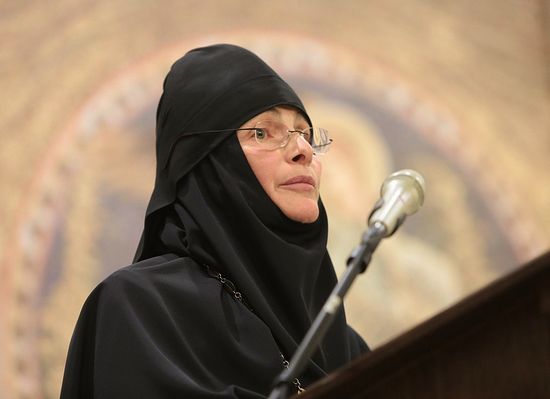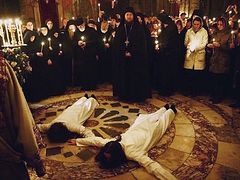Speech by Abbess Maria (Sidiropoulos) of St. Elizabeth Convent in Buchendorf, Germany, of the German Diocese of the Russian Orthodox Church Outside of Russia, read at the round table “Particilarities of Monastic Life in Urban Monasteries” (St. Petersburg, Russia, August 8-9, 2017).
St. Ephraim the Syrian said “It is not tonsure and garb that makes the monk, but a heavenly desire and Divine living, because in this lies perfection in life.”
God’s commandments are the same for both monastics and laypersons.
Emulating Christ and deification are the meaning of earthly life for every person who calls himself a Christian. Asceticism, sorrows, deprivation, spiritual purity, obedience to God are all necessary not only for monastics but for laity. The life of every Christian is or most become parallel to the life of a monastic. But the laws of parallel lines prohibit them from intersecting…
Monastic tonsure is called a “second baptism,” during which hair is clipped, just as during the Mystery of Baptism. The vows made during monastic tonsure do not differ from those made during baptism, except, of course, the vow of chastity that monks and nuns make. But simply refusing married life does not comprise true and ideal chastity; ideal virginity applies not only to the body but to the soul.
The unmarried woman careth for the things of the Lord, that she may be holy both in body and in spirit, said Holy Apostle Paul (1 Corinthians 7:34). In order to observe a vow of chastity, one must fast, pray and avoid contact with the opposite sex.
All of us, monastics and laypersons, in daily prayer to the Lord, utter the words: “hallowed by Thy Name, Thy Kingdom come, Thy will be done, on earth as it is in Heaven.” We ask of God not wealth and domination over our neighbor, but “our daily bread,” and obedience to God’s will, so that the Lord would take reign in our hearts, which is achieved through perpetual repetition of the Jesus prayer. We likewise beseech Him “lead us not into temptation, but deliver us from the evil one,” that is, to preserve us from spiritual faltering. In other words, we can say that with these words monastics and laypersons ask for virtues which in principle comprise the monastic vows: obedience, poverty, virginity.
The monastery (Ησιχαστειριо), as a place of prayer, was originally connected to the concept of quietude. But this understanding extends to the sphere of spiritual peace. External quiet is required only for engendering the easy and quick achievement of inner silence. Regardless of whether the monastery is high in the mountains, in a distant wilderness or in the center of urban chaos, the monastery walls serves its purpose: it protects, defends the inner life of the monastery from external influences not only visibly, but spiritually.
If the monastery has walls but its gates remain open from dawn until dusk for visitors, then the world and temptations will pour into the monastery. And this is for material gain [from pilgrim donations—Trans.] which pale in comparison to that which we lose—the prayer that we accumulate and the mental concentration of the souls entrusted to us. So even if a monastery church is the only one in town, it is wise to limit visiting times.
Some monks who live in noisy cities are guardians of historic sites, for instance, in the Holy City of Jerusalem. But even there, though these sites are meant for veneration for people from all over the world, pilgrims and tourists, they must guard against mobs of visitors. The gates to such monasteries must remain closed for large portions of the day.
The conditions under which one can preserve one’s monastic vows in urban monasteries depend on many internal and external factors. The monastery’s regulations, especially in urban communities, must offer its residents time for seclusion for prayer and spiritual reading. If a monk is given this opportunity after evening prayer, when he has little strength after the day just passed, then he may succumb to slumber from exhaustion. In our convent, we find solitude for the daily prayer rule during the day, two hours before the beginning of vespers, while we still have strength, and this time allows us to refresh in our minds the life of a saint that will be commemorated in church that evening. In practice, this is an foretaste of the coming divine services, for the smooth transition to evening prayer. Adherence to one’s vows is not an external matter, for we are called upon to tend to our mouths and our eyes to achieve our goals, but the main condition and foundation of the fulfillment of vows, both in the city and in secluded hermitages is to recite the Jesus Prayer unceasingly, which is the basis upon which the monastic life is built.
Watch and pray, that ye enter not into temptation (Matthew 26:41), the Lord cautions us. As St. Isidore of Pelusium explains: “In these words of the Savior we must understand: pray so that temptation does not consume us. If the Savior had said what some people assume, that is, that you must pray lest you fall into any temptation at all, this would make no sense; for the Prophets, and the Apostles as well as other successful pious men all succumbed to great temptations. On the contrary, it might be impossible not to fall to temptation at all, but not to be conquered by them is in fact possible. So many of those who suffer ignorance in this matter can become inconsolable when facing hardship, meanwhile those who are guided by piety deflect misfortune not only by enduring temptations courageously but by pondering victory over them.”
When we utter the most sweet name of Jesus, then our mind, occupied with prayer, has neither the time nor the inclination to think of anything else, so that the very invoking of the name of Jesus Christ has the power to heal and purify the mind and heart from earthly bonds and protect us from failure and temptations.
Can anyone who finds himself in the midst of temptation not be tempted? No, of course not.
We are given examples of times when even during terrible persecutions and brutality against the Church of Christ, people would elect the path of monasticism. They lived and labored on par with laypersons in the cities, and such environments did not hinder them from fulfilling their monastic vows, for they were people of prayer, they burned with love and zeal for the ascetic life, for which they were glorified by the Church. In order the obtain such heartfelt fervor, people today must expend great effort, deny the temptations of the internet and constant flow of news from around the world, read Holy Scripture from a book, and not on a smart phone. Having a cell phone in your hand offers the temptation of reading the news of the day.
The monastic community, being an organism of the Holy Church, when healthy also possesses a robust immune system, just like the human body does. So a monk, as part of a monastic community and truly loving the monastic way of life, upon facing temptation can avoid the devil’s snares. He is helped, if you will, by his “monastic immunity,” which kills or resists the virus which attempts to infect his mind.
For all that is in the world, wrote the beloved disciple of Christ, is the lust of the flesh, and the lust of the eyes, and the pride of life (1 John 2:16). This triple evil must be defeated by chastity, poverty and obedience. That is why true monasticism demands the fulfillment of three vows: virginity, poverty and obedience.
The monastery, a place of prayer and silence but located in a noisy city is fated to develop in “climatic conditions” hostile to prayer, if it is not separated into areas accessible and inaccessible to visitors.
Although monasteries may all differ in external ways, all monasteries contain people who labor in common thought, interests and goals—Christ. Sooner or later they will see Christ in the image of their brother, they will access Him through ascetic labors, fasting and inner peace. They will also see Christ in the face of a pilgrim, with whom he may not even speak, but whom he will join in prayer. But many pilgrims think that if a monastic doesn’t talk to them, the monk or nun is cold, haughty and condescending. On the contrary, if a monastic doesn’t speak to pilgrims, he is passing them by physically but not spiritually; without allowing them entry into his mind, he makes them a place in his heart, for he will pray for them in his cell.
St. Barsonophius the Great says: “Not all who live in a monastery are monks, only those who do the work of a monk.” It is not the task of a monastic to befriend pilgrims, the main work of a monk is to live in obedience, prayer, adhering to his monastic vows. An elder once told a monk: “Better they call you unwelcoming and brusque than they praise you and you fall into the prelest’ [self-deception] of pride…”
Socializing with pilgrims can be very dangerous, especially early in one’s monastic life. Pilgrims may unwittingly become the instrument of the devil and remind and stoke in the soul of the monk memories of earthly life.
Striving for perfection and to fulfilling Divine commandments is the nourishment for a monastic, whose path ascends to one’s own personal Transfiguration. Laypersons who may have the same desires walk along a horizontal path, knowingly or not immersed in the cares of daily life.
I can share one experience, though our convent is not an urban one. We are blessed by God to be located in a town of 700 people, 20 kilometers from Munich, but our monastery is the only Orthodox convent in Germany. Our practices show that while performing missionary work in a foreign land, where interest in Orthodox Christianity is growing, although we rarely turn away pilgrims, still, from 12-2 pm and during cell prayers from 4-6 pm, we close our doors to visitors. Before vigil, we open the doors, and after compline we close again. Our nuns do not have blessing to commune with pilgrims.
Our residents do not have personal effects or phones. The nuns do not have blessing to receive gifts from pilgrims or relatives. If they get a package in the mail, they must bring it to me and receive blessing as to what to do with it. Knowing the weaknesses of each nun, I sometimes give my blessing to share the gifts with one nun or another, or keep something for herself and give the rest for common use. In order to prevent the sisters from becoming attached to material goods, they do not have blessing to bring anything into their cells without the abbess’ blessing. By our rule, the nuns cannot and do not have their own money. Going to town for groceries is done by the nuns only once a week, usually on Mondays.
In one of his lectures, our spiritual father [Archbishop Mark of Berlin and Germany] noted the difference between monastic vows and consumption in society today:
- the vow of poverty contrasts with the desire for unlimited consumption of material goods;
- the vow of chastity contrasts with sexual promiscuity;
- the vow of obedience contrasts with the unlimited “personal freedom” which leads one to self-confirmation at any cost.
The goal of monasticism is achieved through the voluntary fulfillment of Christian commandments and the fundamental monastic vows, which are based on Holy Scripture:
- the vow of poverty: Jesus said unto him, If thou wilt be perfect, go and sell that thou hast, and give to the poor, and thou shalt have treasure in heaven: and come and follow me (Matthew 19:21);
- the vow of chastity: For there are some eunuchs, which were so born from their mother's womb: and there are some eunuchs, which were made eunuchs of men: and there be eunuchs, which have made themselves eunuchs for the kingdom of heaven's sake. He that is able to receive it, let him receive it (Matthew 19:12).
- the vow of obedience: Then said Jesus unto his disciples, If any man will come after me, let him deny himself, and take up his cross, and follow me (Matthew 16:24).





